My First Trip to Gaza
Foreword: I'm re-posting this old blog entry about my first trip to Gaza because somehow it disappeared entirely from Packing Lust, probably during the transition from my last blogging service to Wordpress, the one I use now. It's one of my favorites, so I was so sad when I thought it was lost to the void forever. (I didn't have a back up of the text, just the photos). However, Prince Charming managed to find an archive of it online, despite my deleting the old blog before I knew it had gone missing. "Nothing can completely disappear from the internet," he says. (I now back up my blog regularly.) This was originally posted December 18, 2012. Enjoy.
Entry at Erez
"You're not a journalist or anything, are you?" the Israeli soldier in the first booth at Erez Crossing Point asked.
"No." But will I write about what I see? Of course.
Until the New York Times picks up this blog, I am not a journalist. I am free to enter the Gaza Strip through the Erez Crossing thanks to Prince Charming's NGO-worker status and my status as his wife. And from this unique position, needing neither journalist's credentials, nor being blocked from writing by my organization (as Prince Charming is), I can simply tell you what I experienced on my first, short trip to Gaza.
Not that it was simple for me to get into Gaza. First, an employee at Charming's NGO got me coordination with the Israel government and a visa with Hamas, the governing body of Gaza.
We arrived at Erez Crossing on December 12th.
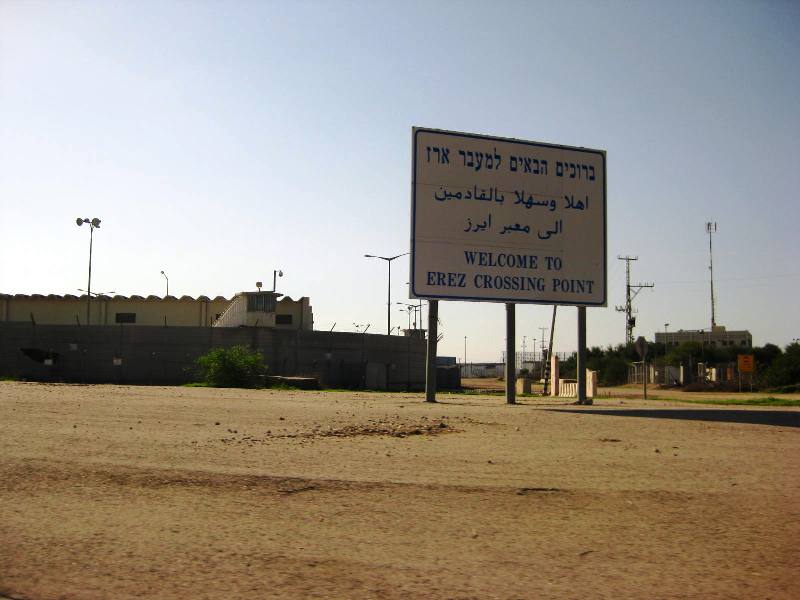
I put my camera away since there was a "no photography" sign at the entrance. The crossing looks like one modern, airy, new airport terminal. It's a large building with a lot of bullet-proof glass and shiny surfaces. We entered after a quick chat with the Israeli soldier who asked if I was a journalist. Then there was an interview with a passport control officer who shuffles papers and flips through every passport. Like many passport officers, she had shimmering, perfectly manicured nails. I think if I were a passport officer, I would too. The only thing there is for a would-be border-crosser to do as you shuffle, flip, and make phone calls is to stare at your hands.
At this point, I need to introduce Osama, one of Charming's colleagus in Gaza. Osama is a Palestinian who lives in Gaza and he is rarely allowed out of the strip. However, he was allowed to visit the West Bank for his job for the first time in a while, and when we went to Gaza, he re-entered with us to rejoin his family.
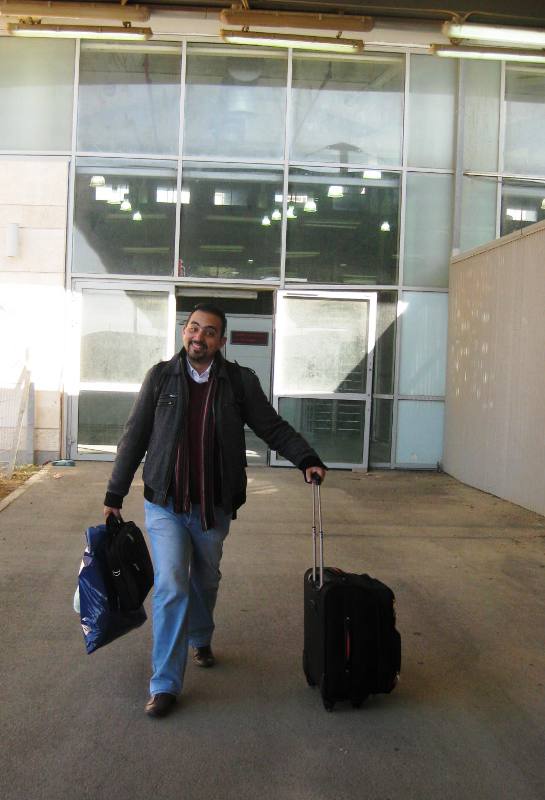 "Back to jail!" Osama said merrily as we entered Gaza.
"Back to jail!" Osama said merrily as we entered Gaza.
Once across the border, we caught a special golf cart we called a tuk tuk that took us across a kilometer of open land that acts as a sort of "no-man's-land" between Israel and the administration of the Gaza border.
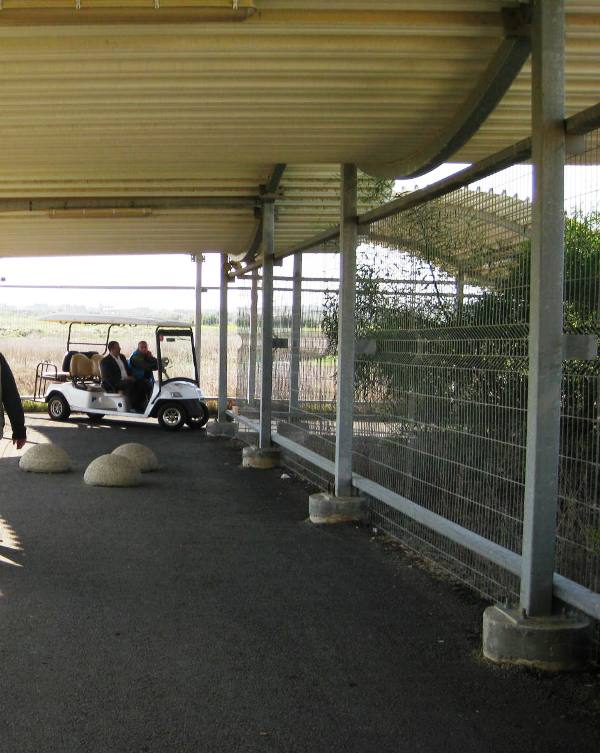
The covered path across no-man's-land.
The tuk tuk is officially for handicapped people, but if it's open, anyone can use it. Charming remarked that the tuk tuk driver has one of the weirdest jobs in the world. Can you imagine when someone asks "what do you do," saying "I drive a golf cart back and forth across the one kilometer separating two countries in conflict."
We then got out at a checkpoint known as Hamsa Hamsa or Five Five, in English. It's run by Fatah, the political party in charge of the Palestinian National Authority, which is the name of the government of Palestine. The Fatah checkpoint is only there because Israel won't talk to Hamas, the political party governing Gaza. Hamas is considered by Israel, the U.S., Canada, the E.U., and Japan to be a terrorist organization. While they seem more humane than other extremist Islamic groups, say the Taliban (who tried to kill Malala Yousafzai), it's their habit of firing rockets indiscriminately into Israel gets them labeled as terrorists.
After the buffer zone of Hamsa Hamsa, we reached Arba Arba (Four Four in English) by cab. Arba Arba is run by Hamas. We picked up our previously arranged paperwork and Hamas officials searched our bags. Cars from the Gaza office arrived and I met more Gaza staff members (of Charming's NGO).
During our twenty minutes at Arba Arba, a magical moment happened. 12/12/12 at 12:12. Charming and I got a photo to memorialize:
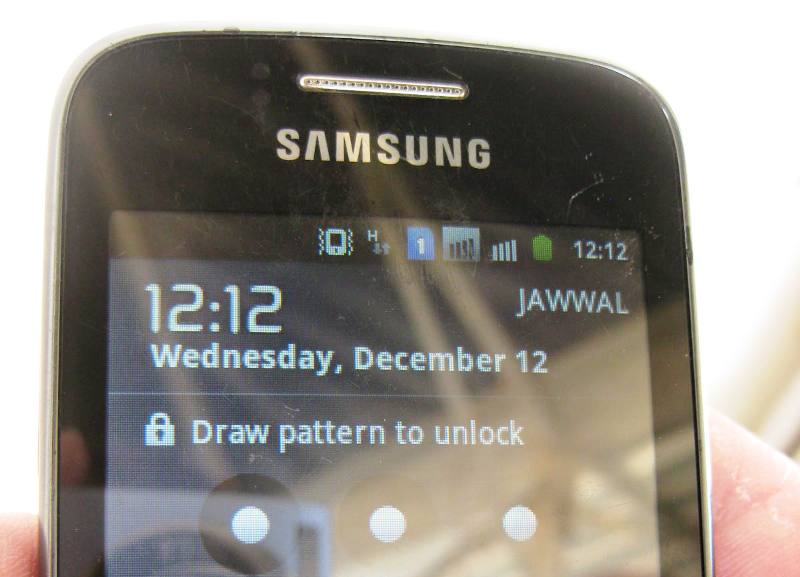
Gaza City
After these three different checkpoints, we arrived in Gaza City. Osama pointed out some of the destruction from the recent conflict. One thing that struck me was the precision of the attacks. Of course the Israelis made mistakes (see above note about children killed) but for the most part, (if we allow ourselves to sweep away the image of 35 dead children with that phrase) Netanyahu kept his promise when he said "...my government has instructed the Israeli Defense Forces to conduct surgical strikes against the terrorist infrastructure in Gaza."
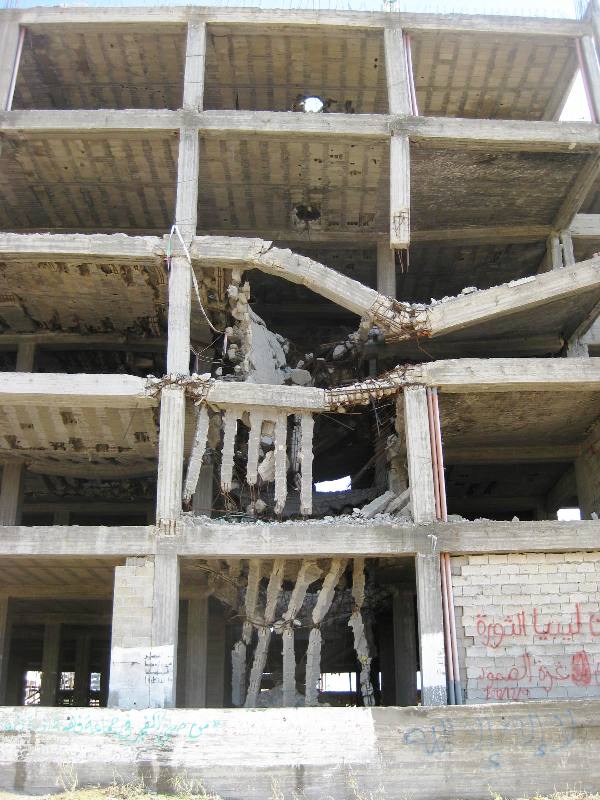
A surgical strike in Gaza City.
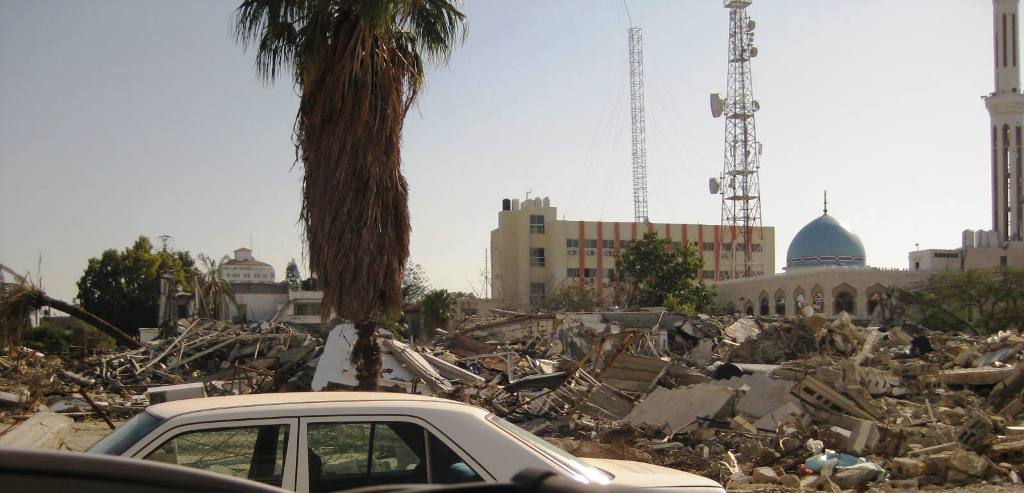
Another precision strike leaves a nearby palm tree and a mosque untouched.
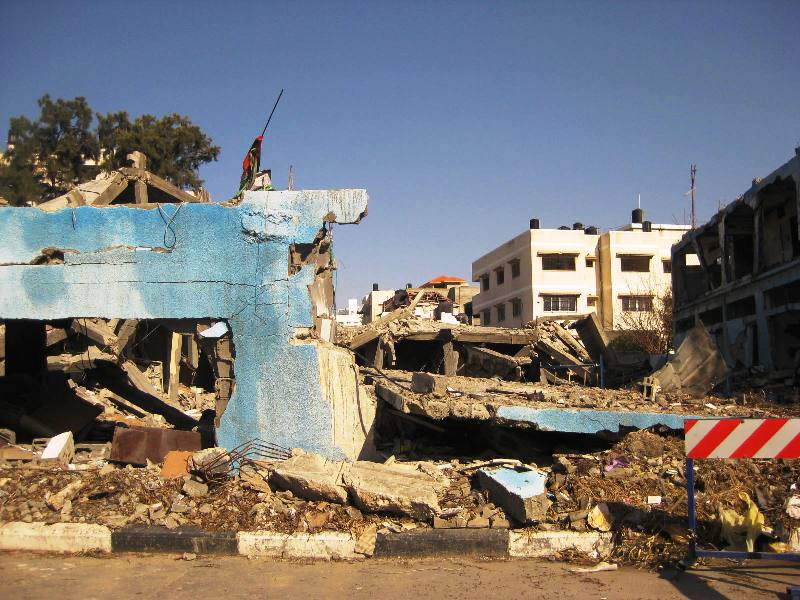
Destruction in Gaza City.
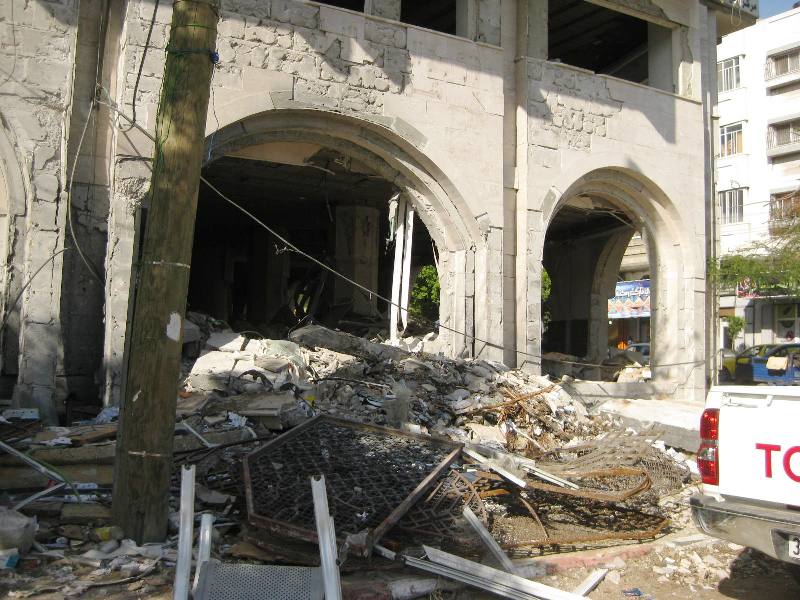
More wreckage in Gaza.
As we drove into the city, Osama greeted a fellow commuter he knew.
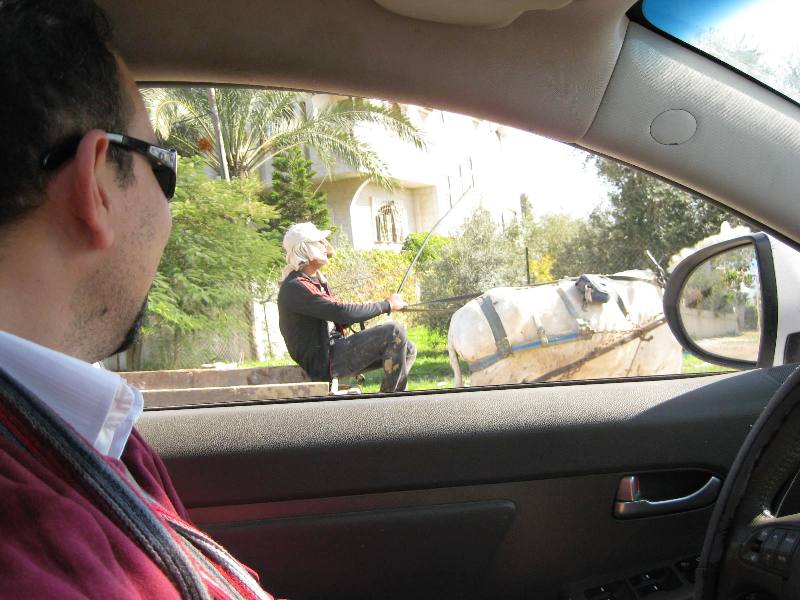
The people in Gaza use a lot of donkeys and horses for transportation and conducting business.
A special export of Palestine is the strawberry. When I tasted my first strawberry here, it was as if I had never tasted a strawberry before. Charming says the Dutch import them from Gaza and the fields are treated with great care and expertise.
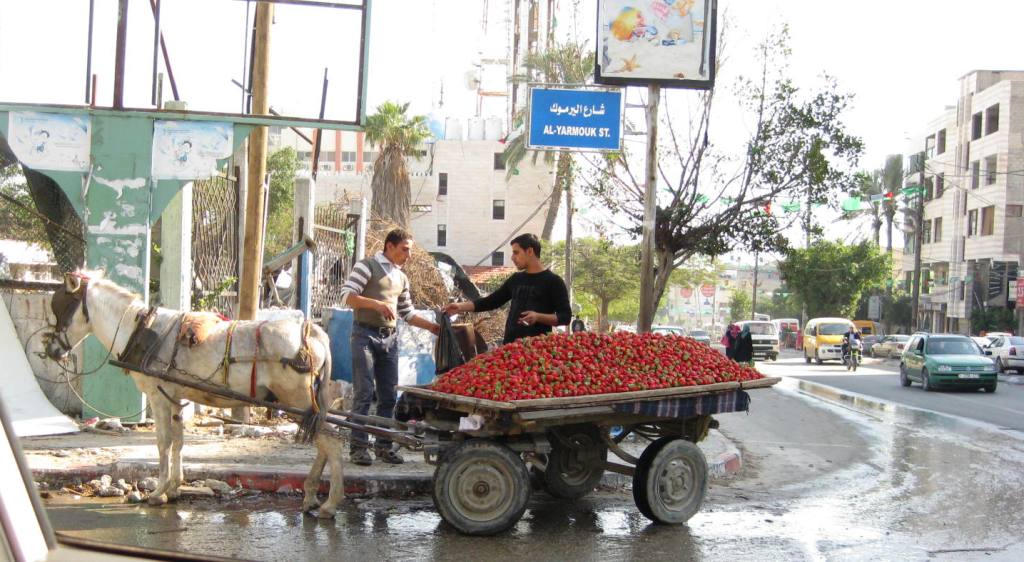
Once we arrived, Lulu, the office receptionist, kindly drove me around Gaza City so I could see the sights. Having already seen a lot of destruction, I was eager to see the beach.
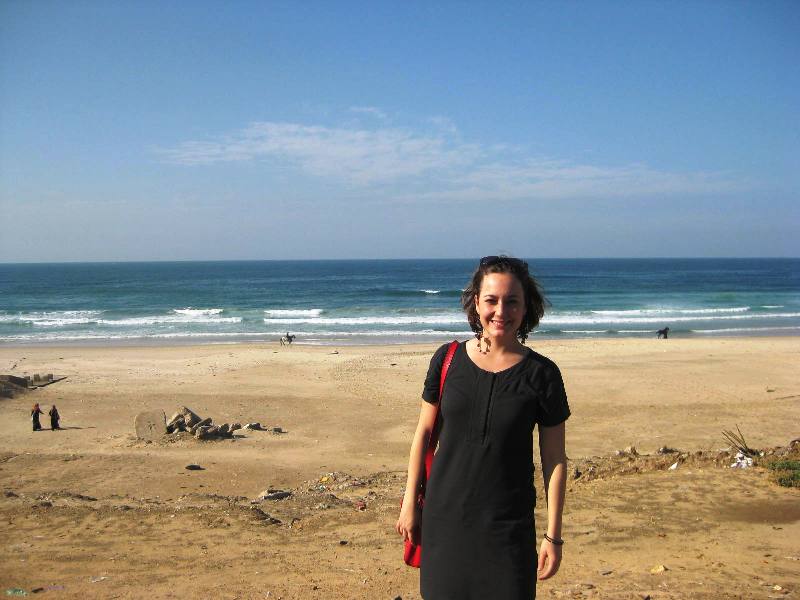
Enjoying the sight of the sea in Gaza.
It was lovely, this portion of the beach having had a walkway put in by Jawwal, our cell phone service provider. There were horses galloping along the water's edge. You can see them tiny in the background of the above photo.
But after that nice photo, I have to show you what happened before we saw the beach, before we had even left the street in front of Charming's office. As Lulu began to drive in front of Charming's organization, a group of men jumped out of a nearby car, and seemed to attack the car in front of us. Men jumped and were pulled out of that car. I didn't have time to feel scared. I snapped a couple photos.
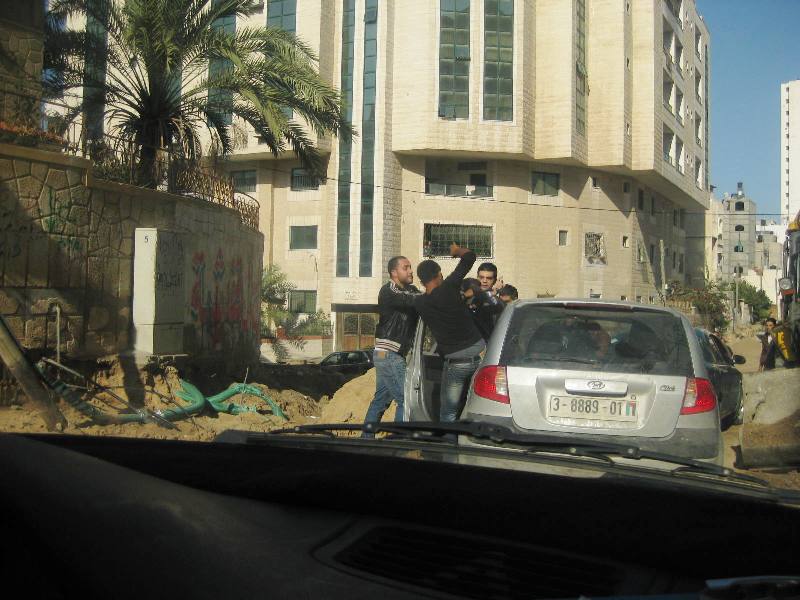
Lulu, composure and smile perfectly intact, backed up, and turned off onto another street. I simply thought the incident it was a bit of road rage on the under-construction, traffic-clogged byway. It wasn't until writing this blog post that I noticed the large knife in the brown-jacketed man's hand in the second photo. Was this a car jacking? A car burglary?
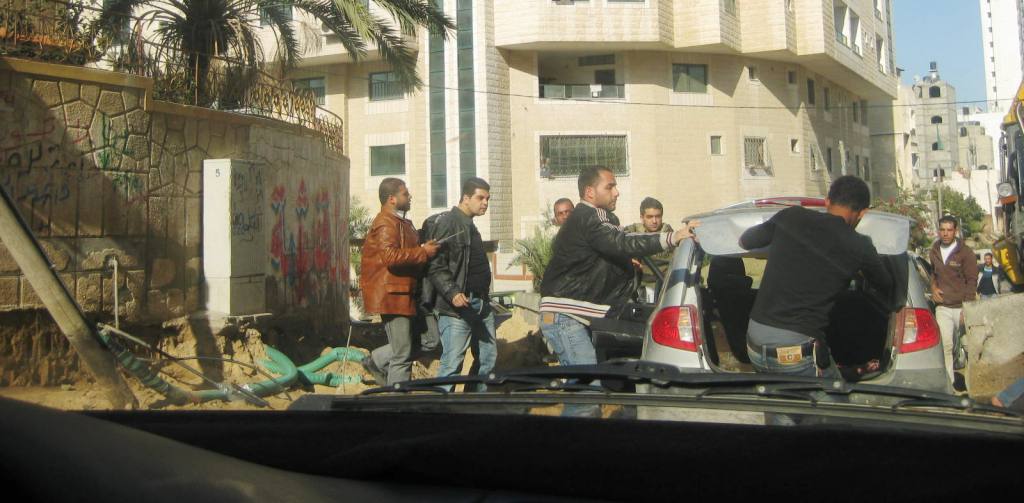
The second photo.
Maybe this explains why, a bit later, Lulu said "you don't seem scared. Some foreigner are afraid to be here." I was thrilled to be somewhere warm and sunny with an ocean view. I didn't think much about the underbelly attributes of Gaza until I was out.
Lulu took me to her future home, a fourth floor condo still under construction.
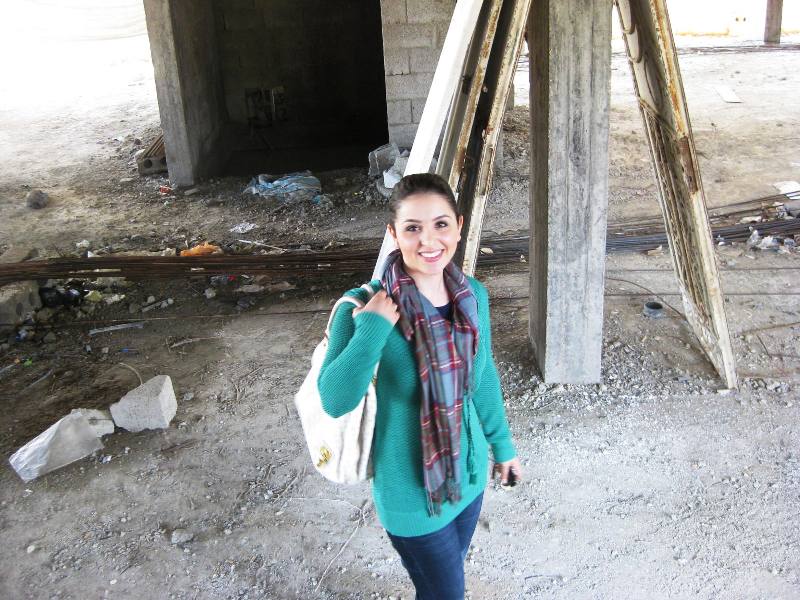
Lulu in her future condo building.
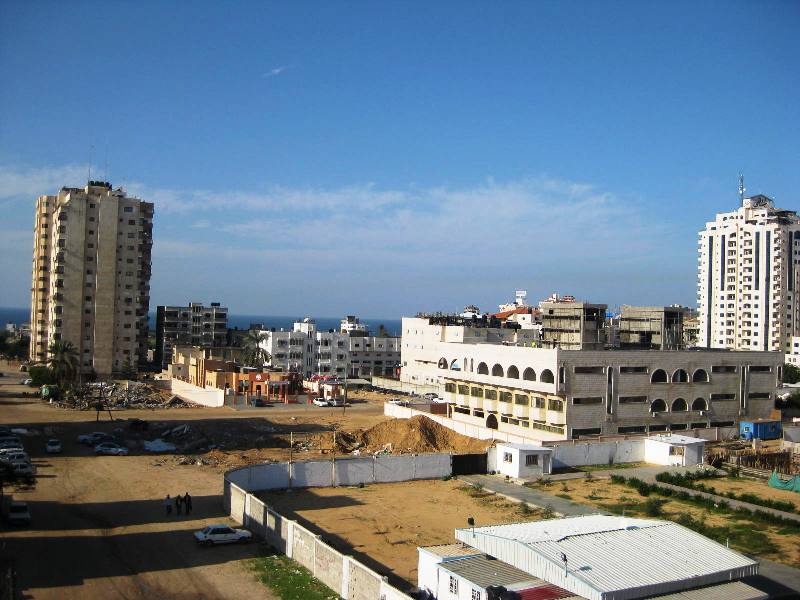
View from Lulu's future home.
We drove by the Gaza City fishing port.
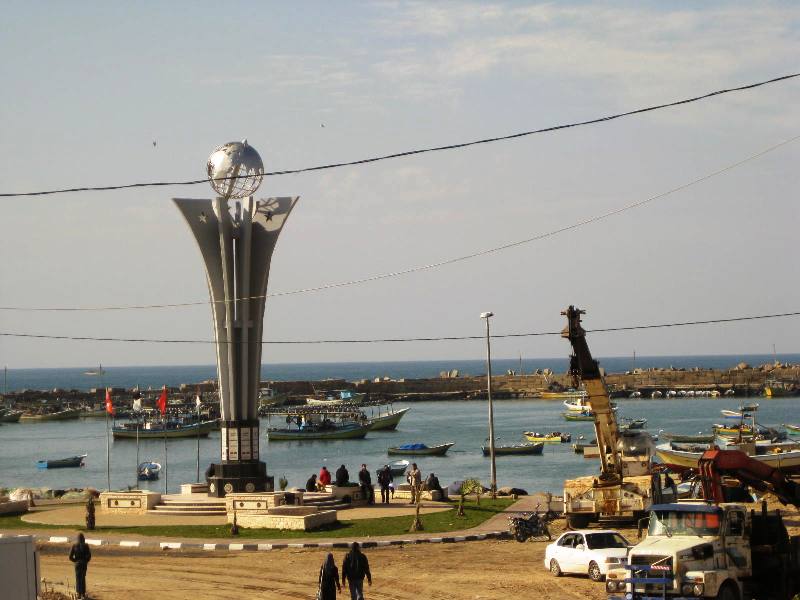
Like a scene out of a Tom Waits movie, near the center of town there was an abandoned circus. I wondered if I'd see a lion or trapeze artist roaming town, feeling lost.
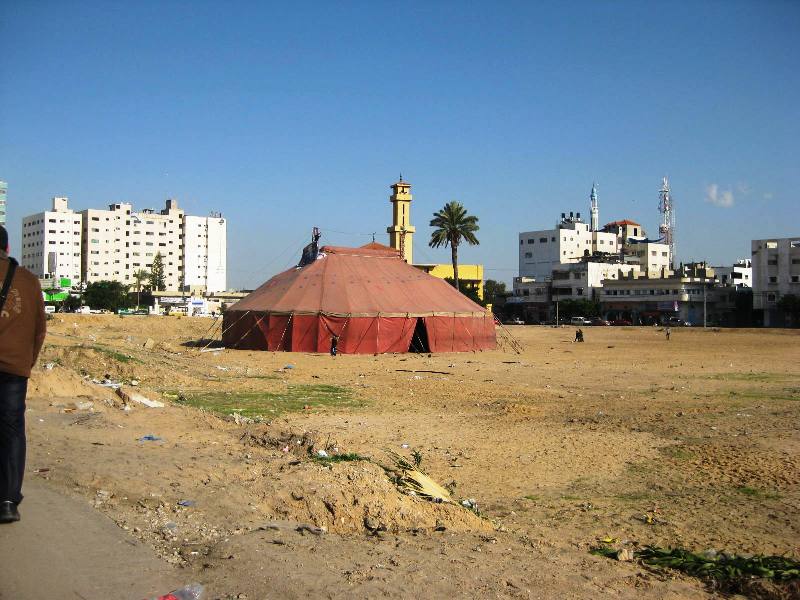
Finally, my tour ended at Lulu's family home where I met her mother, two out of seven sisters, and her brother. We had coffee and cookies served on a tray decorated with hand-embroidered cloth.
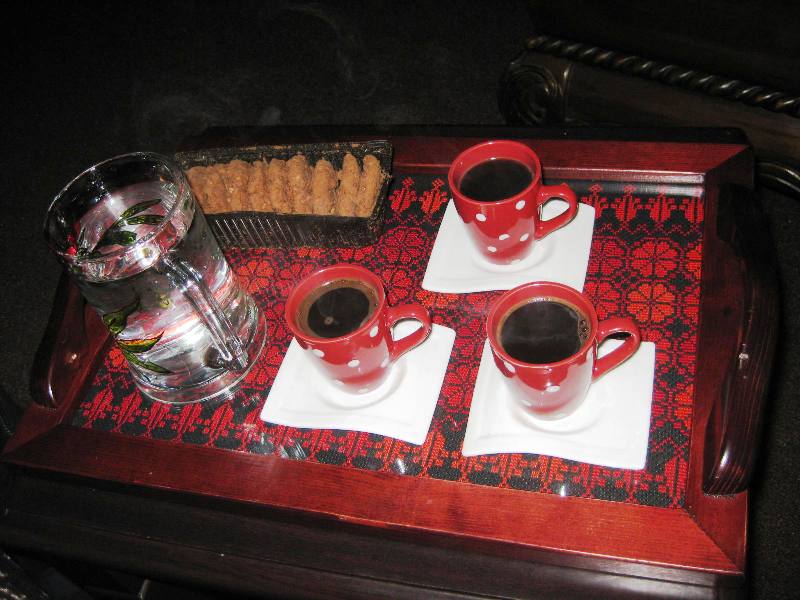
Rafah
Later that evening, we drove with Osama and Arwa down the coast to Rafah, which is on Gaza's border with Egypt. Tunnels connect Rafah to Egypt, and Osama said "Everything you see came in through the tunnels." The streets were filled with the same early-model Mercedes that most of the population drove, making Rafah feel like we were in a movie set in the 60's.
On the way to Rafah, we stopped at a fish restaurant splendidly located with a view of the water. The only sign I saw said "Fish Frsh." Fish Frsh kept live fish in large pools fed from the nearby ocean.
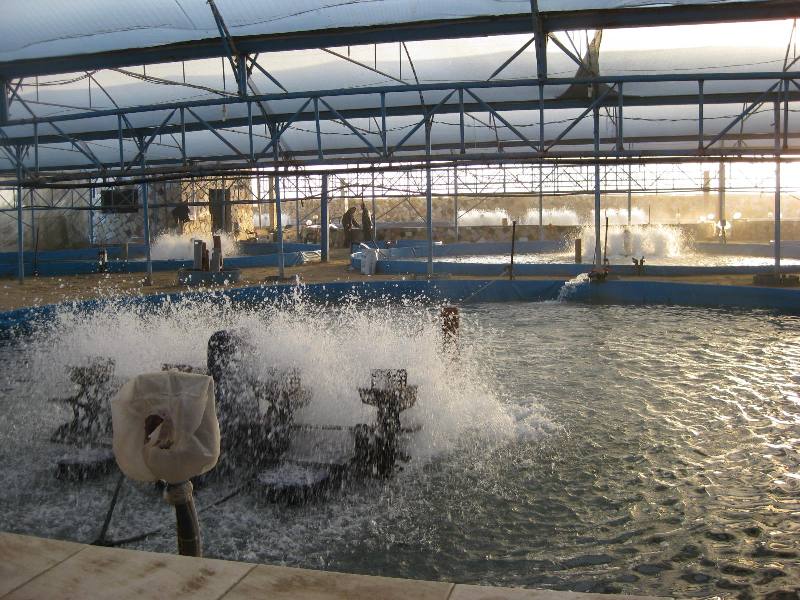
Patrons can attempt to net their own fish for their own dinner plate. I tried, as Prince Charming, Osama, and Arwa looked on.
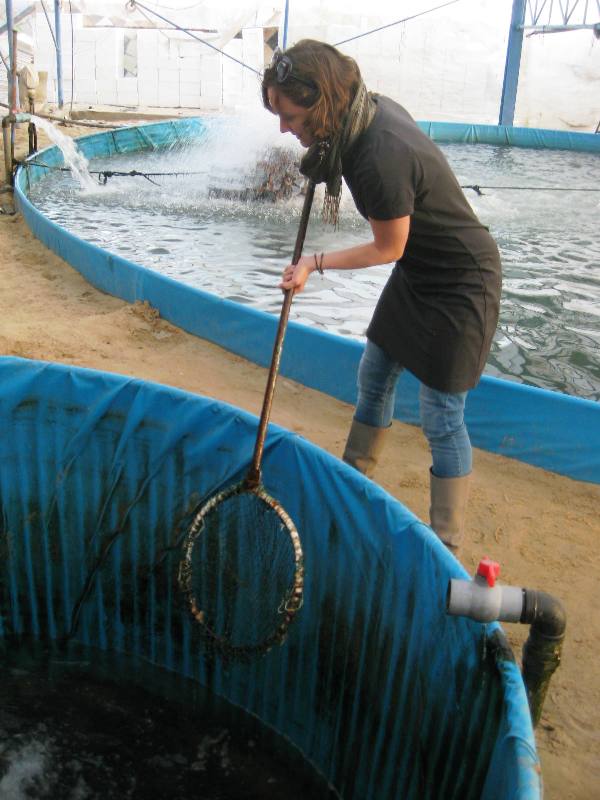
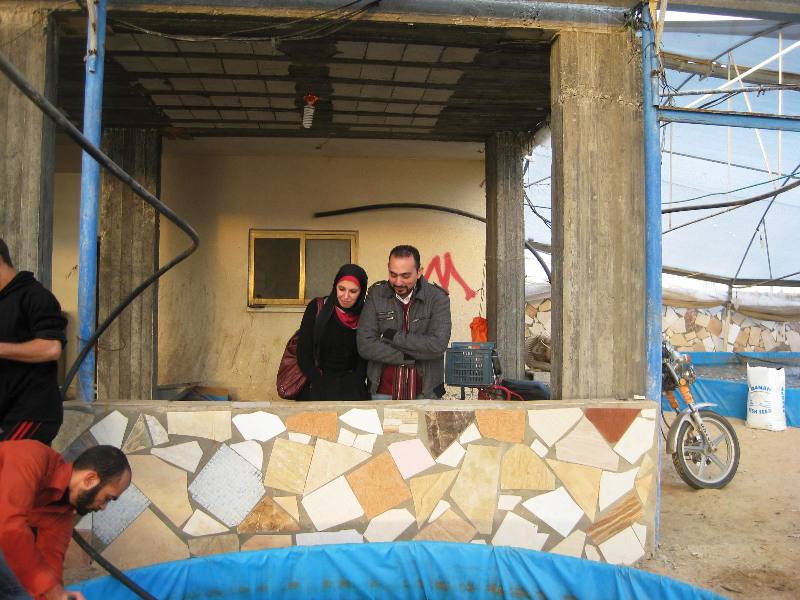
I failed. Osama said he'd never been successful either. One of the employees got down into the tank and netted us a couple of fresh fish, one of which showed up on my plate 20 minutes later.
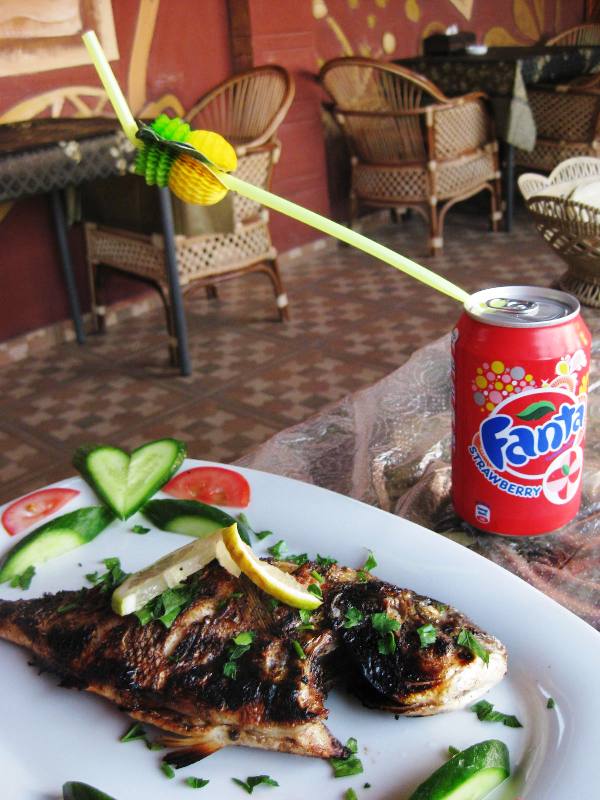
We had a wonderful time chatting and laughing over dinner with Osama and his wife Arwa. Osama is a big fan of argila, which is a very popular hobby/habit/vice all over Palestine. It's also called sheesha, hookah, or, affectionately, hubbly bubbly. We laughed over the fact that extreme Muslims frown on women smoking argila in public because it looks suggestive. Of what? Oh dear, the culture is far too genteel for anyone to actually say what it might be suggestive of. I'll leave it up to you to guess.
Many thanks to Osama and Arwa for being such generous and warm hosts who genuinely seem to love their adopted home, (they are descendants of refugees) yet are honest, educated, and well-traveled enough to rue the fact that they are stuck in Gaza unless they can get jobs overseas. Osama would want you to know that his favorite meal in the whole world is Kentucky Fried Chicken, and he wants peace for many reasons, but partly because he really wants Gaza to get the franchise. He also speaks with enthusiasm about how resilient the Palestinians living in Gaza are. Seriously, I can hardly overstate how kind, hospitable, and tolerant Osama and Arwa are. I wish them the best and hope for peace and all the opportunities they could ever want for themselves and their family.
Ladies Brunch
Prince Charming's office in Gaza is majority male, and so the next day the few ladies at the office invited me to brunch with them at a restaurant in Gaza City overlooking the ocean. I always ask permission before featuring anyone on the blog (except men who attack the car in front of me) but a few of the women at the brunch didn't feel comfortable appearing here, so the only photo I'll show you is of the view of the ocean when it started raining in the middle of brunch.
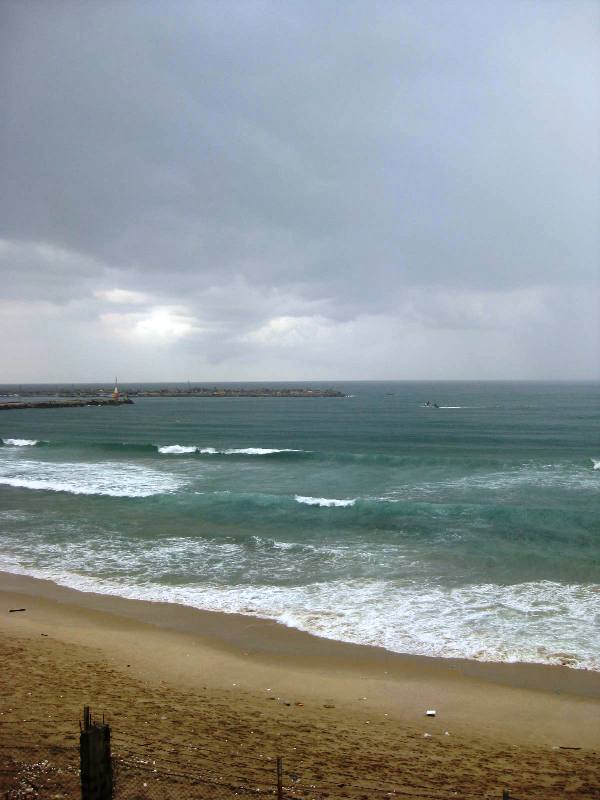
Apparently, it only rains a few times a year in Gaza, so this event was cause for great joy. The women got up and rushed to the window, opening it and putting their hands out to touch the rain. One of them told me "If you ask Allah for anything while it rains, he will give it to you." Another said that as a romantic, she loved to walk in the rain.
As you know, I'm coming from Ramallah, where it's been cold and rainy for weeks. I was surprised at their enthusiasm and then remembered how rare rain was in L.A., and how I'd felt a similar sense of blessing being poured from the sky when it rained there. I sat back and enjoyed the sound of the rain as it poured loudly on the roof of the restaurant where we sat warm and dry.
At the brunch, and several times throughout my visit to Gaza, I tried to find out about the details of the traumas and miseries of a) being in Gaza during the strikes, and b) being a woman in Gaza. My leading questions were not met with complaints or tales of woe. Lulu told me that the day after the ceasefire, everyone was arranging parties and gatherings. Osama drove by a group of men playing soccer by the beach and said "Is this resilience or what!" Others echoed those sentiments. The people of Gaza want to be happy and to have peace just like any other people in the world. They want outsiders to see that they are caring, strong, resilient, and hopeful. They try to see the blessing in the rain.
Exiting Gaza
Getting back into Israel from Gaza was a lengthier process than going in. We quickly passed through Arba Arba and Hamsa Hamsa, this time walking the kilometer from Hamsa Hamsa to the Erez terminal. (The tuk tuk wasn't around.) We walked through large turnstile doors, and then into a room with two large tables. The only direct contact one has with any Israelis during the process is with passport control. In this room, we couldn't see anyone, but Charming told me to open my bags and show them to a camera. The soldiers watching must have been okay with the contents of my bag, because a green light flashed on one of several entry doors, meaning I could go in. Charming and I entered a warren of small chambers separately. Nothing happened in my first chamber, except the light turned green, and I passed into a second, identical chamber. The red light turned green, but when I pressed the door, it didn't open. Someone uttered something in Hebrew that I didn't understand. I tried again, then realized I'd been pressing on the wall, not the door. I found the door, and it allowed me to pass into a luggage checking station. Again, I wasn't sure where to go, but when I looked up, I saw officials looking down on us from a glassed-in upper level. They motioned to me where I should go. Via this system of cameras, speakers, bullet-proof glass, and compartments, the Israeli officials are kept safe from would-be attackers.
We loaded our bags onto a conveyer belt, and another light turned green, allowing us to pass into the room where we picked up our luggage. We only had one more obstacle to get through: passport control. "What's your father's name?" The same well-manicured lady asked. I told her, and she said "What's your grandfather's name?" "Which one?" "You father's father." I told her, and she let me back into Israel. Charming's interview lasted much longer, about an hour. He and the nice-finger-lady chatted, and then he was sent back into the terminal to wait. Finally, after another chat, they let him through. His current passport/visa/paperwork situation is complicated and it took a while for the soldiers to ascertain the legitimacy of his papers. Once they did, we were free to re-enter Israel with a dual sense of gratitude and guilt for those we left behind.

